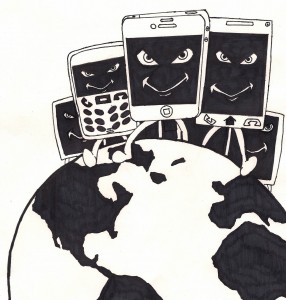
Nothing that makes up society is static.
As society progresses and new technology becomes available, people have become dependent on a device that didn’t even exist 10 years ago — the smartphone.
Changes are always happening. Even the definitions of words are fluid and always morphing.
For years, the face of marriage was a man and a woman. But culture has progressed to include multiple definitions of marriage.
Just as the definition of what constitutes a marriage has changed, so should the definitions of human addiction and what constitutes a drug.
Phones are the first things most people use in the morning and the last they use at night. They pull them out throughout the day, often out of habit. They are kept near at all times and it would be accurate to say that some people feel disconnected or lost without them.
Because of the way smartphones keep users constantly connected to the rest of the world, that feeling of connectedness has become like a drug. Studies have shown that receiving a notification on a phone stimulates the brain’s pleasure center in the same way that a typical drug does.
Dopamine and opioid systems are the culprits, according to an article on PsychologyToday by Susan Weinschenk, a behavioral psychologist. The dopamine-seeking system in the brain searches for behaviors that are pleasurable, and the opioid system likes those behaviors.
These two systems are complementary and once the brain finds something it likes, the seeking stops and the brain is caught in a dopamine loop. This is the scientific reasoning for why it’s so easy to lose an hour to Candy Crush Saga.
In fact, research shows that there is more brain activity when users are anticipating a reward, or notification, than when actually getting one. This can lead to a phenomenon known as phantom vibrations, something common to almost all smartphone users.

Phantom vibrations occur when users think they feel a vibration when their phones are actually silent.
In a 2012 study of 290 undergrads from the Indiana University department of psychology, by Michelle Drouin, Darren Kaiser and Daniel Miller, 89 percent had experienced phantom vibrations.
The Merriam-Webster dictionary definition of addiction is to be physically or mentally dependent on something, or both — to be unable to stop using it without adverse effects.
Adverse effects, or withdrawal symptoms, are the only thing smartphones lack in order to be considered a drug. No research suggests that a user would endure these symptoms like cocaine addicts do.
If anything, not using a smartphone can have positive effects, at least for me.
I was out of the country and unable to use my phone for a week in January.
I found it incredibly refreshing. I slept better at night and felt more focused without the distraction during the day.
It may seem trivial or a little bit amusing that a device like a phone could have that much of an effect on someone. But it’s good to know that there are chemical reasons for constantly picking up and checking the phone.
Matt Murphy can be reached at [email protected] or @matthewcharlesz on Twitter.








